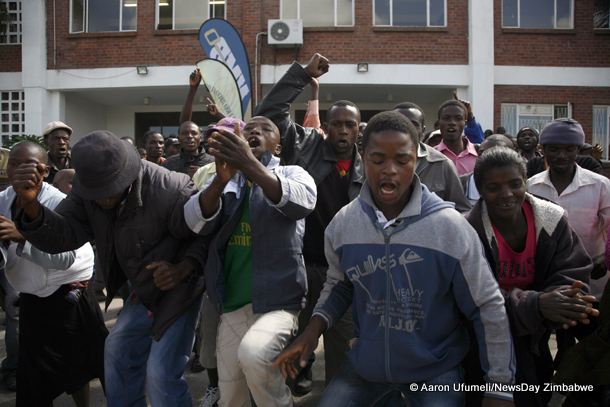Chaos at Boka tobacco auction floors
By Brian Latham
HARARE – Tobacco farmers disrupted an auction on the first day of Zimbabwe’s marketing season as prices for the country’s biggest agricultural export plunged.

Sales were halted temporarily Wednesday at the Boka Tobacco Auction Floors in Harare, the capital. Police arrived at the auction house, the country’s second-largest, to monitor and control the protest.
The average price offered by merchants was $3.50 a kilogram (2.2 pounds), the Tobacco Industry and Marketing Board said in a statement posted at the auction house. That was 28 percent lower than the first day of the season last year, when the average was $4.85.
“We were expecting $4.99 a kilogram,” Luckmore Mandlazi, who farms the crop near Headlands in eastern Zimbabwe, said in an interview. “This isn’t empowerment of black farmers.”
Zimbabwe’s farmers, who once rivaled the U.S. as the source of the world’s best quality tobacco, sold 205.5 million kilograms last year, earning $651.9 million.
The government cited the biggest sales total in 13 years as vindication of President Robert Mugabe’s land-transfer campaign.
This year, the customary February start of the sales season was delayed after crops were damaged by heavy rains followed by dry periods, which prompted TIMB to predict a smaller harvest.
“Heavy rains led to water-logging, leaching of soils and widespread destruction of tobacco infrastructure,” Industry and Commerce Minister Mike Bimha said Wednesday at another auction in Harare.
Farm Invasions
“If the issue is about pricing, they should talk to the regulator, TIMB,” Rudo Boka, chief executive officer at Boka, said at the sale. “I am distressed. We had laid out 2,500 bales today, now you have people dancing at my floors.”
Tobacco is the country’s second-biggest earner after minerals. The crop, traditionally sold between February and June, earned farmers an average $3.17 a kilogram last season.
Last year’s sales topped the 200 million-kilogram mark for the first time since 2001, according to TIMB data. That year the market was still dominated by large-scale, mainly white-run farms. Often violent government-backed invasions that began in 2000 eventually pushed about 3,000 growers and 300,000 workers off land that now makes up small and medium-scale black-run holdings.
In the seven years following the start of the land seizures in 2000, Zimbabwe’s world rank as an exporter of top-grade, or flue-cured, tobacco slipped to sixth from second. Zimbabwe was the world’s ninth-biggest producer in 2012, with output of 115 million kilograms, according to data from the United Nations’ Rome-based Food & Agriculture Organization. China, with 3.2 billion kilograms, was the top producer.
Farmers will pay a levy of 1.5 cents on each dollar earned to help finance reforestation efforts after environmentalists complained that small-scale growers have been felling trees to heat barns that cure the crop, Bimha said.
Zimbabwe’s state-owned Forestry Commission reckons that at the current rate of deforestation, Zimbabwe’s natural woodland will disappear within 50 years. Bloomberg






